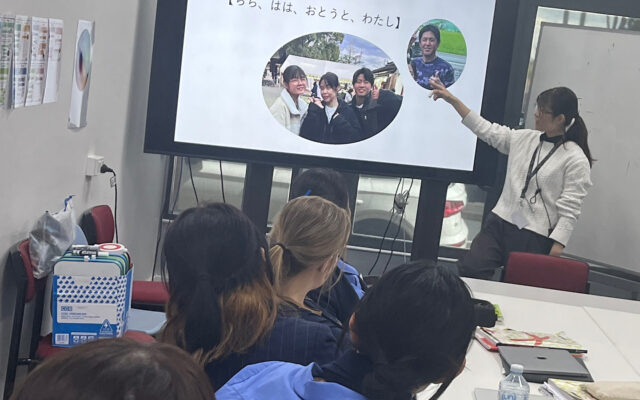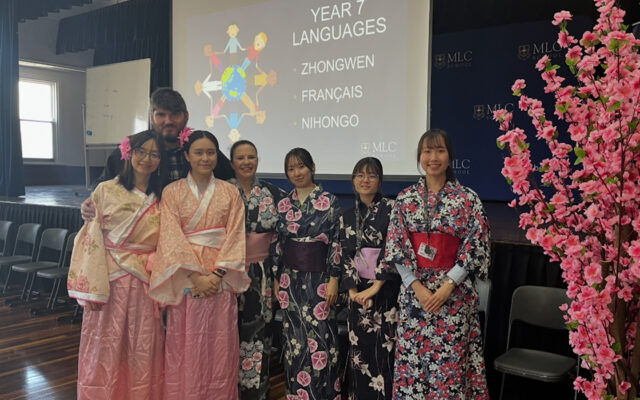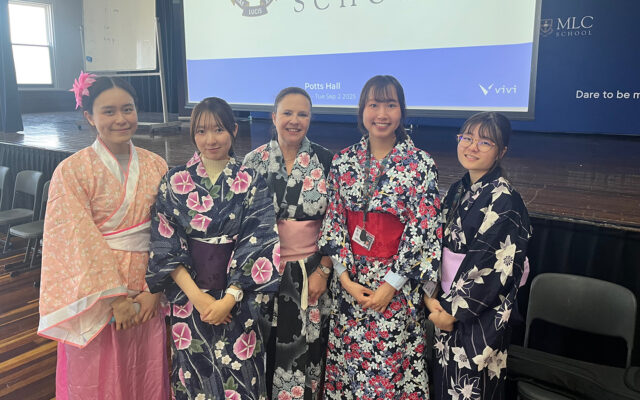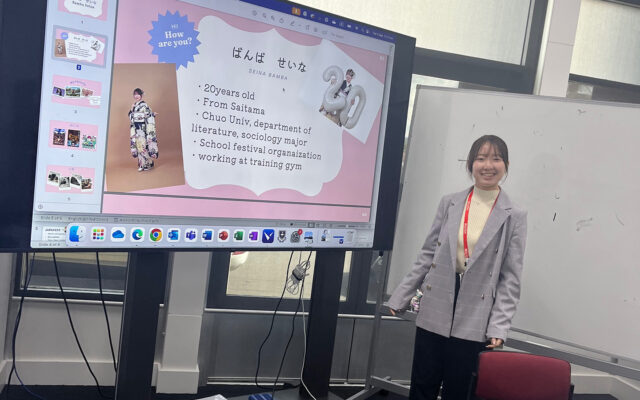Nani ga suki? We love Japanese!
Nani ga suki? We love Japanese!
This term in Japanese classes we have been fortunate to welcome five university students to MLC School. I would like to introduce our final assistants, Seina Bamba and Momoka Shibairi who have been making a wonderful contribution to the Japanese classes. Their support and enthusiasm is appreciated. Not only have they shared cultural insights, the opportunity to speak with native assistants prior to the speaking exams has been invaluable for the students. Momoka sensei and Seina sensei share their thoughts about MLC School below.
– Natasha Collins
Assistant Head of Department – Languages
Momoka Shibairi
Hello I’m Momoka. I’m a student at Kyoto Prefectural University. I major in British literature and English Education for High School students in Japan. I live in Shiga, Japan. Shiga is famous for Lake Biwa, the largest lake in Japan. I like reading novels, manga, and singing a song. I am so happy if you say hello to me when you find me at school. Nice to meet you!
Seina Bamba
Hello, I’m Seina. I am from Saitama, Japan. I am currently a student at Chuo University in Tokyo. I am studying Sociology. I am interested in exploring how people’s interactions and social structures shape our everyday lives. In my free time, I enjoy watching dramas, going shopping, and exercising.
I am very glad to have the opportunity to meet you guys here, and I look forward to learning from this experience.
Q.1 What do you find most surprising about the way Japanese is taught in Australia compared to Japan?
Momoka: I was surprised at the dialogues in the student’s textbook. In general, when Japanese students learn a language like English, they remember grammar at first so that there is no sentence that they cannot understand in a dialog. On the other hand, students in Australia start with a dialog, so I thought it would be hard to consider while they read it. However, the campaign to have the Japanese studying style adjust to overseas styles like here is beginning.
Seina: I’m most surprised that students in Australia actively participate in Japanese classes. Unlike in Japan, where classes often focus on listening and writing, here students join in conversations, games, and cultural activities, which makes learning much more engaging.
Q.2 What are your favorite Japanese words or phrases, and why?
Momoka: It is “なんとかなる” (nantokanaru). It means, like, “Everything will be OK.” I tend to worry about everything I would do, but this word makes my mind better. I think this is a key to things going well.
Seina: My favourite Japanese word is “いただきます“(itadakimasu). I like this word because it expresses gratitude not only for the food but also for the people and efforts behind it. Saying it has become such an important habit in daily life that if I don’t say it before eating, I feel something is missing.
Q.3 What advice would you give to students who are just starting to learn Japanese?
Momoka: I know Japanese is a complicated language because of letters, grammar, and so on. However, Japan has lots of traditional cultures, and people cherish them. You can also about Japanese culture through language. Your curiosity about Japan and its culture must be a motivation to keep studying. Have fun!
Seina: Japanese is difficult at first, but I recommend focusing on enjoying the learning process. There are fun ways to learn it. You can watch anime, listen to Japanese music, or try simple conversations with friends. Enjoying the language in daily life makes learning easier and more effective.
Q.4 What motivated you to become an assistant and intern in a Japanese language program abroad?
Momoka: I am interested in education and how student learn best. While learning about education in Japan, I have become curious about the differences of school life between Japan and abroad. Therefore, this opportunity is precious for me.
Seina: I was motivated to become an assistant and intern in a Japanese language program abroad to grow personally and professionally. Helping students learn Japanese allows me to improve my communication skills, gain international experience, and learn more about different cultures.
Q.5 What do you miss about home, and what have you enjoyed the most about your time in Australia?
Momoka: I really miss the taste of miso soup. I regret not bringing Japanese cuisine to Australia. Even so, I enjoy my life in Sydney. I bought a manga (in English) at the bookstore and started reading in my spare time. It is interesting to see how the Japanese phrases I know are translated into English.
Seina: I really miss soaking in a onsen (hot bath). In Australia I can only take showers, so I miss the relaxing feeling of a warm bath. I’ve enjoyed sightseeing the most in Sydney, it is really beautiful here. I loved visiting famous places, seeing nature and animals, and the restaurants in Circular Quay were amazing.
Click on gallery to view full images






